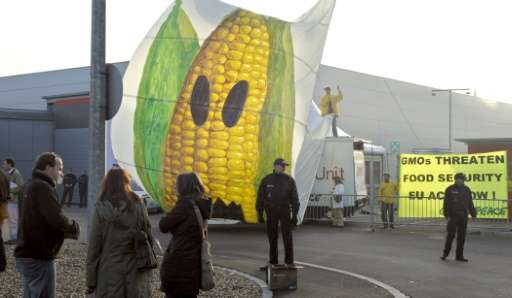EU lawmakers throw out GMO compromise law (Update)

EU lawmakers on Wednesday rejected by a huge majority a hard-won compromise which would have allowed EU member states to decide for themselves whether or not to import Genetically Modified Organisms for use in food and animal feed.
Parliament voted 557 to 75 against a law which took the European Commission years to negotiate amid deep suspicions about the possible health and safety implications of GMO products.
The outcome, however, turned on a matter of principle—allowing member states to ban GMO products would mean erecting barriers within the EU's most cherished achievement, its single market of more than 500 million people.
"Today's vote gave a clear signal to the European Commission. This proposal could turn on its head what has been achieved with the single market and the customs union," said centre-right Italian MEP Giovanni La Via who chairs parliament's environment committee.
La Via said the new rules—first proposed in 2010—could have harmed EU agriculture "which is heavily dependent on protein supplies from GMO sources."
"Finally, there are concerns over whether this proposal could even be implemented, because there are no border controls in the EU," he said in a parliament statement.
La Via said previously he believed existing legislation should be retained, with national bans excluded.
GMOs hugely controversial
GMOs are hugely controversial in the EU, stirring sharp debate over their use and impact.

Some member states say they may carry as yet unknown health risks and are not necessary in any case, while others believe they are essential for the future and to ban them would turn the bloc into a scientific backwater.
The Commission, the EU's executive arm, tried for years to bridge the positions but eventually decided to offer member states an opt-out mechanism to end the impasse.
Those that want to grow and import GMOs would be allowed to do so, while those that do not, could ban them.
In January, lawmakers approved the opt-out legislation on cultivation and it is unclear what the next step is now after Wednesday's vote to reject the same compromise on import and use.
EU Commissioner for Health and Food Safety Vytenis Andriukaitis said the proposed legislation would not be withdrawn and the matter will have to be discussed with ministers.
The Commission said recently that 19 of the 28 member states had asked to keep GMOs out of their territory, creating a complicated patchwork even within member states themselves.
For example, the British government which strongly supports GMOs, sought opt-outs for Scotland, Wales and Northern Ireland, leaving only England to allow GMO crop cultivation.
Similarly, Belgium opted to keep its French-speaking Wallonia region GMO-free.
The situation is further complicated by ongoing talks on a massive EU-US free trade accord, with Washington backing GMO use and hostile to any restrictive measures on them.
Greenpeace said it welcomed the vote "because the Commission's plan would have failed to provide additional protection of European citizens and the environment from the risks posed by GMO crops."
Copa-Cogeca, which groups several major farmers organisations, also welcomed the result but on the grounds that the Commission proposals would have distorted trade while existing legislation was adequate.
"Jointly, we believe that a timely application of the existing EU legislation will provide for the much needed legal and regulatory certainty for all operators," it said.
So far only one GM crop is cultivated in the EU—Monsanto's MON 810 GM maize which has been bio-engineered to protect against a harmful pest.
There are also eight pending applications for GMO cultivation, including the renewal of the MON810 authorisation.
Additionally, 58 GMOs are authorised for import into the EU for food and feed uses.
© 2015 AFP





















